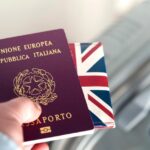Do you just need a passport to travel to Italy? Traveling to Italy, like any other country, requires certain documentation and compliance with entry requirements. This article will break down the basic necessities for a smooth and hassle-free travel experience to Italy.
When planning a trip to Italy, one of the fundamental documents needed is a valid passport. But is a passport alone sufficient? It’s essential to understand if additional visas are required for entry into Italy, depending on your nationality. Visa requirements can vary based on your country of origin, so it’s crucial to verify this information before your trip.
In addition to having a valid passport and possibly a visa, travelers must also ensure that their passport meets the validity requirements set by Italian authorities. Different countries have varying validity requirements for passports entering their borders, so it’s wise to check that your passport will still be valid for the duration of your stay in Italy. Failure to comply with these conditions could lead to denial of entry at the border.
Visa Requirements
When planning a trip to Italy, it’s important to ensure that you have all the necessary documentation in place. In addition to a passport, many travelers may also need to obtain a visa to enter the country. The visa requirements for Italy vary depending on your nationality and the purpose of your visit. Here is a breakdown of the visa requirements for traveling to Italy:
- Visa-exempt countries: Citizens of certain countries are exempt from needing a visa for short stays in Italy (typically up to 90 days). These include countries such as the United States, Canada, Australia, and Japan. However, it’s essential to check the specific visa requirements based on your nationality before traveling.
- Schengen Visa: If you are not from a visa-exempt country, you may need to apply for a Schengen visa. This visa allows you to travel within the Schengen Area, which includes Italy and many other European countries. The Schengen visa is typically valid for up to 90 days within a 180-day period.
- Long-stay visas: If you plan to stay in Italy for more than 90 days or if you’re traveling for purposes other than tourism (such as work or study), you may need to apply for a long-stay visa. These visas have specific requirements and application processes based on your circumstances.
In addition to obtaining the necessary visa, it’s essential to have a valid passport when traveling to Italy. Your passport should be valid for at least three months beyond your planned departure date from the Schengen Area. It’s always advisable to check your passport’s validity well in advance of your trip and renew it if necessary.
Ultimately, when planning your trip to Italy, make sure you do thorough research on the specific visa requirements based on your nationality and travel plans. Consulting with the Italian embassy or consulate in your country can provide you with accurate and up-to-date information regarding visas and entry requirements. By ensuring that you have all the required documentation in place, you can enjoy a smooth and hassle-free journey to Italy.
Passport Validity
When planning a trip to Italy, one of the most important things to consider is the validity of your passport. Italian regulations require that your passport remains valid for at least three months beyond your planned departure date from the Schengen area. This means that if you plan to stay in Italy for a month, your passport should be valid for at least four months after your arrival date.
Renewing Your Passport
If your passport does not meet the validity requirements, it is crucial to renew it before traveling to Italy. It is advisable to check your passport’s expiration date well in advance of your trip to avoid any last-minute complications. You can renew your passport at a local passport office or through an expedited service if you are short on time.
Keeping Your Passport Safe
While traveling in Italy, it is essential to keep your passport safe at all times. It is recommended to make copies of your passport and store them separately from the original document.
Additionally, consider using a money belt or neck pouch to prevent theft or loss of your passport while exploring the beautiful cities and countryside of Italy. Remember that losing your passport can quickly turn a dream vacation into a nightmare, so take precautions to protect this essential travel document.
Entry Requirements
When traveling to Italy, there are specific entry requirements that travelers must meet beyond just having a passport. While Italy is part of the Schengen Area, which allows for easy movement between member countries, there are still important considerations to keep in mind.
One key requirement is that your passport must be valid for at least three months beyond your planned departure date from Italy. This ensures that you have ample time on your passport in case your travel plans change or are extended.
Additionally, travelers may be asked to show proof of sufficient funds to support themselves during their stay in Italy. This can include cash, credit cards, or traveler’s checks.
Having a return ticket or onward travel plans can also help demonstrate that you do not intend to overstay your allowed time in the country. It’s important to note that these requirements may vary depending on your nationality, so it’s always best to check with the Italian consulate or embassy in your country before traveling.
For travelers coming from certain countries outside the EU, a visa may be required for entry into Italy. The type of visa needed will depend on the purpose and duration of your visit. It’s essential to apply for the correct visa well in advance of your trip to ensure smooth entry into Italy.
Some travelers may be eligible for visa-free entry for short stays, while others may need to obtain a Schengen visa. Make sure to research the specific requirements based on your nationality and travel plans before departing for Italy.
Traveling With Minors
When traveling to Italy with minors, it is essential to ensure that you have all the necessary documentation to make the journey smooth and hassle-free. Here are some important documents that you will need when traveling with children:
- Passports: Just like adults, children also need a passport to travel to Italy. Make sure that their passports are up-to-date and have sufficient validity left before your trip.
- Visa (if applicable): Depending on the nationality of the child, they may require a visa to enter Italy. Check the visa requirements for minors from your country beforehand.
- Parental Consent Form: If a child is traveling without one or both parents, a parental consent form may be required. This document states that the child has permission from their legal guardians to travel.
It is crucial to double-check all the required documentation before your trip to avoid any last-minute complications or delays at the airport. Failure to provide the necessary paperwork can result in denied entry into Italy.
When traveling with minors, always carry copies of important documents such as birth certificates, vaccination records, and any custody agreements if applicable. In case of an emergency or if authorities request additional paperwork, having these extra copies can prove invaluable.
Overall, ensuring that you have all the required documents when traveling with children not only helps streamline the check-in process but also ensures a stress-free travel experience for you and your family. Planning ahead and being well-prepared will allow you to focus on making precious memories during your visit to Italy.
Other Documentation
When traveling to Italy, it is important to note that in addition to a valid passport, there may be other documentation required for entry into the country. One key document that travelers should have on hand is their travel itinerary or return ticket. Italian authorities may ask for proof of onward travel to ensure that visitors do not overstay their visa or entry allowance. It is advisable to have a printed copy of your itinerary or e-ticket readily available.
Travel Insurance
While not mandatory, having travel insurance is highly recommended when visiting Italy or any other country. Travel insurance can provide coverage for medical emergencies, trip cancellations, lost luggage, and more. Some Schengen countries require proof of travel insurance with a minimum coverage amount, so it is important to check if Italy has any specific requirements in this regard. Having travel insurance can give you peace of mind during your trip and protect you from unexpected costs.
Proof of Accommodation
Another document that may be needed when entering Italy is proof of accommodation. This can include a hotel reservation confirmation, a booking at a bed and breakfast, or an invitation letter if staying with friends or family. Italian authorities may ask for this information to confirm where you will be staying during your visit. It is advisable to have printed copies of your accommodation details easily accessible when going through immigration control.
Traveling From the EU
Traveling from an EU country to Italy offers some special considerations in terms of documentation requirements. As a member of the Schengen Area, travel between Italy and other Schengen countries within the EU is generally more straightforward.
Citizens of EU countries can enter Italy with just a valid national identity card, as no passport is required for intra-Schengen travel. This makes trips within the European Union more convenient for individuals who do not possess a passport or prefer to travel without one.
However, it is important to note that while traveling from one EU country to another may not necessitate a passport, it is always advisable to carry this identification document with you. Having a passport ensures that you have a recognized form of identification in case of unforeseen circumstances or if you plan on traveling outside the Schengen Area during your visit to Italy.
Additionally, having a valid passport can streamline border crossings and verification processes at airports and other entry points.
For travelers coming from non-Schengen EU countries, such as Bulgaria, Croatia, Cyprus, Ireland, and Romania, the rules regarding passport requirements may vary. In general, it is recommended to carry your passport when traveling internationally to ensure smooth entry into Italy. While a valid national ID card may be sufficient for border control within the Schengen Area, having a passport provides an extra layer of security and proof of identity while abroad.
| Key Considerations | Details |
|---|---|
| Travel within Schengen Area | No need for passport; valid national ID card suffices |
| Outside Schengen Area | Carrying a passport is recommended for international travel |
| Non-Schengen EU Countries | Passport may be required when traveling from certain EU nations |
Conclusion
In conclusion, when planning a trip to Italy, it is essential to remember that having a valid passport is a must. While a visa may not be required for short stays for many nationalities, it is always prudent to check the specific requirements based on your country of origin. Ensuring that your passport meets the validity requirements is crucial, as entry into Italy may be refused if your document is not up to date.
Furthermore, travelers should familiarize themselves with any specific entry requirements that Italy may have in place, especially considering the ongoing global situation. It is also important to note that when traveling with minors, additional documentation such as birth certificates or consent forms from parents or guardians may be necessary. For those coming from EU countries, there are certain special considerations and benefits in terms of travel within the Schengen Area.
Overall, while having just a passport may be sufficient for traveling to Italy for many visitors, it is always recommended to do thorough research and be prepared with all necessary documentation before embarking on your journey. By ensuring that all requirements are met beforehand, you can enjoy a smooth and hassle-free travel experience in this beautiful Mediterranean destination.
Frequently Asked Questions
Can I Travel to Italy With Just My Passport?
Yes, you can travel to Italy with just your passport as a U.S. citizen. Italy is part of the Schengen Area, so a valid passport is sufficient for stays under 90 days.
What Is Required for a U.S. Citizen to Visit Italy?
In order for a U.S. citizen to visit Italy, a valid passport with at least six months validity beyond the planned stay is required. Additionally, proof of sufficient funds and a return ticket may be requested by immigration officials upon entry.
Is a Travel Document the Same as a Passport?
A travel document is not the same as a passport. While a passport is an official document issued by a country’s government to its citizens for international travel, a travel document can refer to various forms of identification or visas required for entry into specific countries.

I’m a passionate traveler, writer, and Italophile. My fascination with Italy’s history, art, and culture has led me on countless adventures across the Italian landscape. Through “I Live Italy,” I share my love for this extraordinary country and aims to inspire others to explore its boundless beauty.





